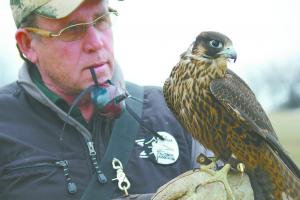Birds Of Prey Protect High-Value Crops
 ✖  |
Birds of prey chasing nuisance birds to prevent them from destroying crops is about as natural as you can get when it comes to pest control, says Robert Payne, part owner of Advanced Avian Abatement. He and his business partner, Justin Robertson, have figured out how to make their passion for falconry pay by contracting with large fruit producers to protect ripening fruit from swarms of hungry birds.
Payne travels from Kansas to Washington State in the summer with up to five birds that include Aplomado falcons, peregrines and Harris hawks. He stays with the birds from sunup to sunset, releasing one bird at a time to patrol and chase birds away from ripening cherry and blueberry crops. Contracts with producers usually last about two months, beginning before the fruit ripens through harvest.
While nuisance birds get used to propane cannons, noisemakers and scarecrows, they stay away from birds that can eat them, Payne says.
Because he works with protected birds of prey and is dealing with songbirds, the business is highly regulated. The Fish and Wildlife Service created regulations to allow abatement using raptors to control pest birds less than a decade ago.
“The U.S. Fish and Wildlife Service protects the birds we are hazing and the raptors. Everyone has to follow the letter of the law, of which there are many.” he explains.
Payne uses a whistle and food rewards to control his birds, which are trained to haze and scare the nuisance birds. They do occasionally catch and kill the birds they’re chasing, but those are usually the old or sick birds in a flock.
Still, he notes, far fewer birds are killed compared to other control methods such as netting and poisoning. Payne adds that using birds of prey is only cost efficient on high value crops and 60 acres or more, when covering plants with nets would be expensive and labor intensive.
“I’ve heard managers say they’ve lost million dollar crops in days. A lot of birds just peck into the fruit, but producers still lose the crop,” Payne says.
Using birds to control birds is a developing market; there are others doing similar work in other states. Payne says the biggest challenge is locating customers who can benefit from the service.
For him, it’s an ideal job to work outside with his beloved birds.
Contact: FARM SHOW Followup, Advanced Avian Abatement, 8350 W. 191 St., Stilwell, Kansas 66085 (ph 816 507-9275; info@advancedavianabatement.com; www.advancedavianabatement.com).

Click here to download page story appeared in.
Click here to read entire issue
Birds Of Prey Protect High-Value Crops BIRD CONTROL Birds of prey chasing nuisance birds to prevent them from destroying crops is about as natural as you can get when it comes to pest control says Robert Payne part owner of Advanced Avian Abatement He and his business partner Justin Robertson have figured out how to make their passion for falconry pay by contracting with large fruit producers to protect ripening fruit from swarms of hungry birds Payne travels from Kansas to Washington State in the summer with up to five birds that include Aplomado falcons peregrines and Harris hawks He stays with the birds from sunup to sunset releasing one bird at a time to patrol and chase birds away from ripening cherry and blueberry crops Contracts with producers usually last about two months beginning before the fruit ripens through harvest While nuisance birds get used to propane cannons noisemakers and scarecrows they stay away from birds that can eat them Payne says Because he works with protected birds of prey and is dealing with songbirds the business is highly regulated The Fish and Wildlife Service created regulations to allow abatement using raptors to control pest birds less than a decade ago “The U S Fish and Wildlife Service protects the birds we are hazing and the raptors Everyone has to follow the letter of the law of which there are many ” he explains Payne uses a whistle and food rewards to control his birds which are trained to haze and scare the nuisance birds They do occasionally catch and kill the birds they’re chasing but those are usually the old or sick birds in a flock Still he notes far fewer birds are killed compared to other control methods such as netting and poisoning Payne adds that using birds of prey is only cost efficient on high value crops and 60 acres or more when covering plants with nets would be expensive and labor intensive “I’ve heard managers say they’ve lost million dollar crops in days A lot of birds just peck into the fruit but producers still lose the crop ” Payne says Using birds to control birds is a developing market; there are others doing similar work in other states Payne says the biggest challenge is locating customers who can benefit from the service For him it’s an ideal job to work outside with his beloved birds Contact: FARM SHOW Followup Advanced Avian Abatement 8350 W 191 St Stilwell Kansas 66085 ph 816 507-9275; info@advancedavianabatement com; www advancedavianabatement com
To read the rest of this story, download this issue below or click
here to register with your account number.







